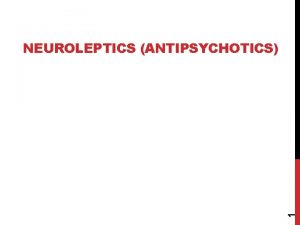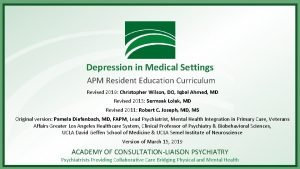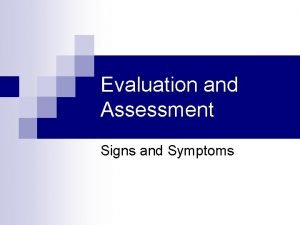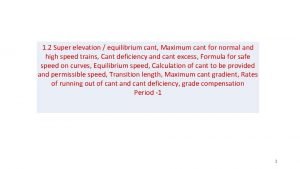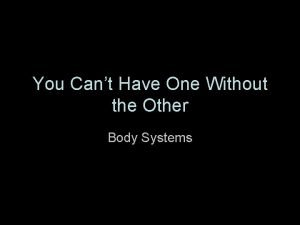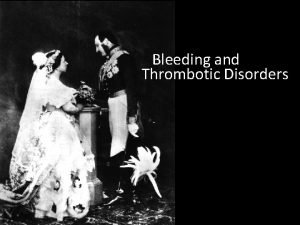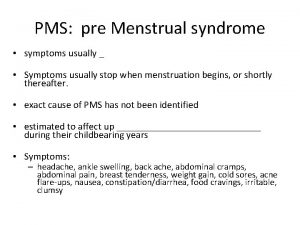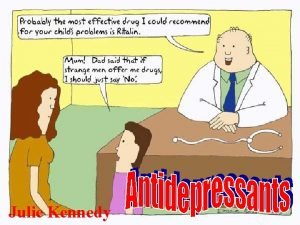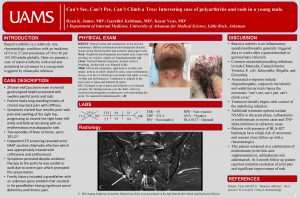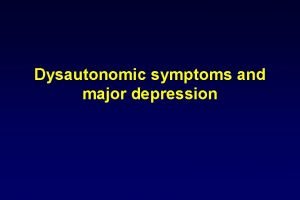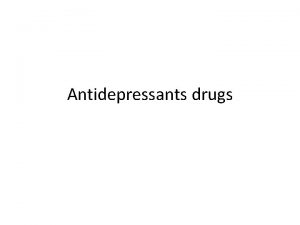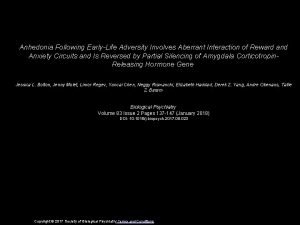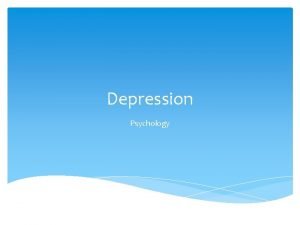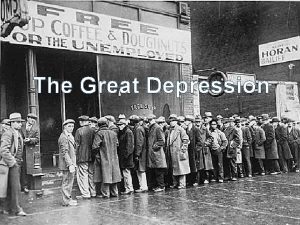Symptoms of Depression Cant feel joy Anhedonia Usually






















- Slides: 22


Symptoms of Depression Can’t feel joy – Anhedonia ◦ Usually withdraws from these activities Too little / Too much sleep ◦ Fatigue Cognitive problems ◦ Can’t concentrate Feelings Suicide of guilt or worthlessness

People in the US who. . Currently ◦ 1 in 20 Will have major depression www. cdc. gov/nchs have major depression in their life ◦ 1 in 5 Kessler 2005

Animal tests

Learned Helplessness Models (how long did it take them to stop moving? ) F orced S T wim (Sleepy, not dead) est Tail Suspension. Test

Motivation / Reward Models (Doing less of what you used to do) Sucrose Preference Social Avoidance Sexual Preference

Brain structure change Decrease in size of ◦ Hippocampus Cognition & learning ◦ Pre Frontal Cortex? Emotional control Decision making Amygdala (mixed results) Emotional learning Most don’t see any change

Physiological causes

Serotonin + Norepinephrine + Dopamine

Brain Derived Neurotrophic Factor (BDNF) “brain food” Neuropeptide


Brain Derived Neurotrophic Factor (BDNF) In depressed individuals ◦ Dereased Hippocampus Prefrontal Cortex ◦ Increased Ventral Tegmental Area Nucleus Accumbans

Hypothalamic – Pituitary – Adrenal axis System which controls stress responses

Genetic Depression is heritable All the mentioned systems have mutations Having genetics that make you prone to depression doesn’t mean you will have it….

Epigenetics ‘the study of changes in genome function that occur without a change in DNA sequence‘ “DNA is just a tape carrying information, and a tape is no good without a player. Epigenetics is about the tape player. ”

What will you find in the papers? DNA ◦ Methylation On the Cytosine at Cp. G sites Inhibits gene expression

DNA Demethylase? DNA methyl Transferase inhibition Methyl Group expression

What will you find in the papers? Proteins ◦ Methyl cytosine binding protein (Me. CP) Bind methylated cytosine Further repression

What will you find in the papers? Histones ◦ Acetylation Increases expression ◦ Methylation Usually decreases expression Lysine 4 – activates Lysine 9 – inhibits Lysine 27 - inhibits

Histone Acetyltransferase (HAT) Acetyl groups Histone Deacetylase (HDAC) Histone Methyltransferase (HMT) Methyl groups Histone Demethylase (HDM)

The End was that so bad?

Active DNA demethylation. Wolffe A P et al. PNAS 1999; 96: 5894 -5896 © 1999 by National Academy of Sciences
 If you want joy real joy wonderful joy
If you want joy real joy wonderful joy Anhedonia synonym
Anhedonia synonym You can t manage what you don t measure
You can t manage what you don t measure If you can't measure it you cant manage it quote
If you can't measure it you cant manage it quote Joy to the world unspeakable joy
Joy to the world unspeakable joy Symptoms of depression
Symptoms of depression Ject throw
Ject throw Is tender breasts a sign of pregnancy
Is tender breasts a sign of pregnancy Rob cant freshfields
Rob cant freshfields I cant but he can
I cant but he can Why we cant see air
Why we cant see air From can to cant
From can to cant Shy lovers try positions they can't handle
Shy lovers try positions they can't handle The provision of equilibrium cant can be seen in case of
The provision of equilibrium cant can be seen in case of Verb 2 fly
Verb 2 fly You can't have one without the other
You can't have one without the other If you cant beat them join them
If you cant beat them join them I bet you cant
I bet you cant Cant turn off
Cant turn off Why cant we see atoms
Why cant we see atoms Railway curves iricen
Railway curves iricen You cant manage what you dont measure
You cant manage what you dont measure Cant cove base
Cant cove base

